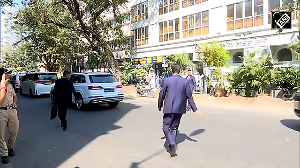A chain always snaps at its weakest link. Shashi Tharoor was the weakest link in a chain of mounting misdemeanour in the United Progressive Alliance. His exit became inevitable for a variety of reasons, ranging from the manner in which he defended himself to the government's concern about managing its narrow majority in Parliament. Mr Tharoor became, in a manner of speaking, the Bangaru Laxman of the UPA.
Just as Mr Laxman's misdemeanours paled in significance compared to the humongous corruption of some members of the Atal Behari Vajpayee government, so may Mr Tharoor's, even though the "sweat equity" snapped up by his companion is not exactly a paltry sum. Mr Tharoor's misdemeanours became amplified by his own attempt to differentiate himself from the run-of-the-mill politician. For all his learning, erudition and sophistication, he fell for the same kind of temptations that lesser mortals do and then claimed, pompously, that he was doing this for Kerala! The Tharoor episode should put the constituent parties of the UPA on alert and ensure that there is a scaling down of corruption at higher levels of government. The mix between politics, business, entertainment and sport has become a lucrative cocktail of cronyism, nepotism and corruption.
Indeed, the belated tax raids and other investigations into the functioning of the organisations managing the game of cricket come after months of delay, raising questions about why the delay. Even as charges of corruption have gone up, so too have tax raids and phone taps. It is not clear if Prime Minister Manmohan Singh will be able to secure control of this leviathan in the remainder of his term, having largely failed to do so in the past six years. However, if Dr Singh is serious about improving the reputation of his government for probity in public life, then he must stop taking a lenient view of ministerial misdemeanours even at this late stage in his tenure.
The second UPA government has got itself embroiled in far too many avoidable controversies. Ministers working at cross purposes, senior party leaders criticising their party colleagues in government, prime ministerial directives happily flouted, parallel centres of advice and power making a mockery of governmental priorities. At a time when far more important issues of national development and national security ought to engage the time and energy of senior functionaries of the government, so much effort is put into managing sports and the private businesses of public servants. Some blame it all on the weakness of a divided and moribund Opposition, others on the ruling coalition's own weak leadership, with the infamous division of powers between "party" and "government" having gone awry. It is also clear that there is a power struggle of sorts within the Congress party that now runs parallel to the on-going ideological battles within. The waywardness of UPA-II brings to mind the famous lines of William Yeats poem, The Second Coming, "Things fall apart; the centre cannot hold; Mere anarchy is loosed upon the world, The best lack all conviction, while the worst are full of passionate intensity."





